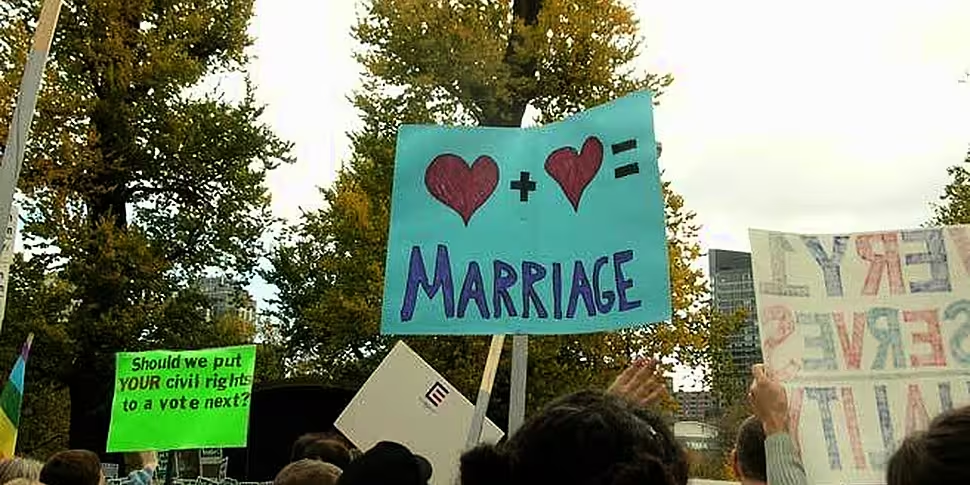The “next generation”, that Leo Varadkar referred to in his recent interview during which he announced that he was a gay man, is probably baffled as to why there is a need for a debate on the issue of same-sex marriage - let alone a referendum to alter the Constitution.
A ‘Yes Equality’ campaign run last November in University College Cork (UCC) to encourage students to register to vote ahead of May’s referendum indicated strong support of its passing in favour of marriage equality. However, Dick Murphy, Deputy President of the Students’ Union in UCC, said that although “students want to vote, complacency is [the referendum’s] biggest opponent.”
Meantime, Labour Minister Aodhán Ó Ríordáin, who is leading the government’s campaign for a ‘Yes’ vote, has also voiced open concerns that voter complacency and low turn out, among other issues, could lead to the proposition being rejected, and the referendum falling at the final hurdle. This is despite the fact that a pre-Christmas Ipsos-MRBI opinion poll put support for same-sex marriage at 71 per cent.
The social climate in a country can steer the course of a referendum result, of that there is no doubt. The Divorce Referendum of 1986 was rejected by a comfortable 25 per cent margin. Some 935,983 of the 1,482,644 votes cast dismissed the proposal.
However, when the same amendment was put to the Irish electorate in 1995, it was passed by a mere 0.5 per cent margin. This was at odds with Irish society at the time, which in ten years had made enormous strides towards a more liberal social climate - and that 70 per cent of the electorate had said they were in favour six months earlier. In the end, just over 9,000 people carried that bill through.
The phases of marriage equality in Ireland
Inequality is not a new moon rising on the marital horizon. It has seen many phases. If our young electorate revise its recent history, they will see how imperative their voice and vote is in turning the tide this time around.
Registered civil marriage in Ireland is only 170 years old and for nearly three quarters of its recorded life span, one half of the marital couple – the woman – had little or no rights, once they took their vows.
For example, up until 1973, women in the public service had to resign from their jobs once they got married. This was not a decision arrived at following a close look at the budgetary books – say, by comparing the spiralling cost of childcare with that of their hard-earned take home pay, as might happen within individual families today. It was her marital status alone that removed a woman’s right to work.
The position of a married mother was no less flattering. Up until 1974, a married woman was unable to collect the children’s allowance unless she received a mandate from her husband. But even at that she was permitted to spend it - that privilege remained with the children's father.
Finally, when it came to protecting themselves from a violent spouse, women had to wait until 1981 before they could apply for a barring order that would last for more than three months.
That these infringements on equality existed within a marriage may seem baffling today to anyone under the age of 35 - as baffling as the opposition that inevitably exists within Irish society to same-sex marriage. But unless we, the youthful electorate, take time out from our social networking and viral uploading to turn out and cast a vote, it is that opposition that could well carry the day.
The young guns
A report published in 2003 by Pat Lyons and Richard Sinnott as part of a research programme for UCD on voter turnout found that a person’s willingness to show up at the polls increases with age. The study found that in the 2002 General Election, nearly 20 per cent more of over 55s turned out to vote than those within the 18-24 age bracket. A pretty impressive gap - although not quite as impressive as the 38 per cent gap in favour of the 54-year-olds in the European Elections of 1999.
A ‘Register To Vote’ campaign run by UCC’s LGBT Society over 15 days in November last year managed to register 3,666 students and has hopefully mobilised them to vote and thwart any occurrence of historical repetition in low voter turnout.
Another vote was held over January 26th / 27th on whether the Student’s Union should campaign for marriage equality. The polls showed 2501, of the 2621 who voted, were in favour – something which the society’s auditor James Upton hopes will “spark passion within the students ... and fuel the discussion until the eventual referendum.”
Students in University College Dublin have also given a huge endorsement for the ‘Yes’ campaign. On February 10th/ 11th the students cast their votes in a UCD Students’ Union Referendum with 97 per cent of those who voted in favour of marriage equality.
One can only hope the wave of momentum will carry them to the polling station.
The need for a referendum on same sex marriage may flummox many. But the fact is that there is one. Opinions and appraisals may be getting tweeted, favourited, snapped and shared. But that is not enough. Voters need to leave their idealism and optimism online and embrace realism with the paper ballot. Your opinion doesn’t matter if you don’t cast it in the real world.
Unless we vote, the sun will set on equality in marriage once again.
You can follow Michelle McBride on @MichelleBride or read her blog missunderstoodteacher.









